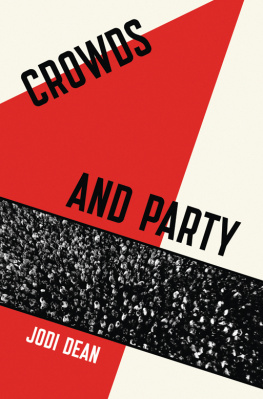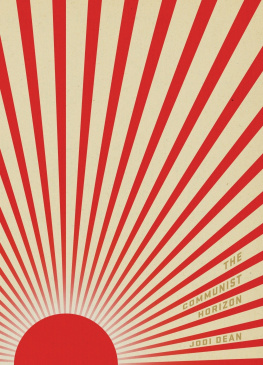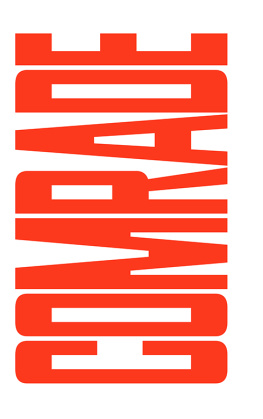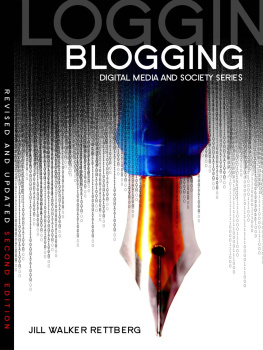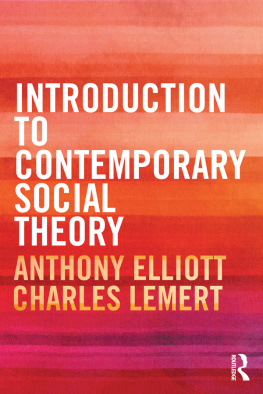The right of Jodi Dean to be identified as Author of this Work has been asserted in accordance with the UK Copyright, Designs and Patents Act 1988.
All rights reserved. Except for the quotation of short passages for the purpose of criticism and review, no part of this publication may be reproduced, stored in a retrieval system, or transmitted, in any form or by any means, electronic, mechanical, photocopying, recording or otherwise, without the prior permission of the publisher.
A catalogue record for this book is available from the British Library.
The publisher has used its best endeavours to ensure that the URLs for external websites referred to in this book are correct and active at the time of going to press. However, the publisher has no responsibility for the websites and can make no guarantee that a site will remain live or that the content is or will remain appropriate.
Every effort has been made to trace all copyright holders, but if any have been inadvertently overlooked the publisher will be pleased to include any necessary credits in any subsequent reprint or edition.
Acknowledgements
As with so much else at the intersection of new media, politics, and critique, this book was instigated by Geert Lovink. Not only did he push directly for a theoretical pamphlet on blogs and blogging (entitled Blog Theory from the outset), but I wrote the second chapter in close email conversation with Geert and in response to his exemplary Zero Comments . I am particularly indebted to his insistence on the national and linguistic shapings of the blogipelago as well as to his unparalleled talent in creating the tags and phrases that capture the truths of the media environment.
Exchanges with James Martel helped clarify my thinking about the possibilities for politics that the concept of drive may capture or open up.
Readers of my blog, I Cite , have long provided comments, feedback, and new experiences of association (many friendly, some not so much) indispensable for my thinking through of the ways that blogs and social media are coding the kinds of subjects we are becoming. I am particularly indebted to Alain Wittmans thoughtful engagement and continued provocation.
I am grateful to Henk Oosterling and Jos de Mul for the opportunity to present an early version of the discussion of drive and networked media in their seminar in the Faculty of Philosophy at Erasmus University in Rotterdam. I also want to thank Darin Barney from the Department of Art History and Communication Studies at Media@McGill at McGill University for the invitation to present some of my work on whatever blogging as a Visiting Beaverbrook Media Scholar. Matt Kadane provided valuable suggestions on the history of self-writing. Victoria Lehman and Leah Himmelhoch supplied much needed guidance on reading and writing practices in ancient Rome. Thanks as well to Justin Clemens, Anna Kornbluh, Dominic Pettman, and Ken Wark for their generosity in reading and commenting on various chapters. John Thompson has been supportive and patient since the projects inception.
Sadie and Kian Kenyon-Dean guide me through the turbulence of networked communication and entertainment media, doing their best to keep me up to date. And finally thanks to Paul Passavant for his insight, good humor, and love.
The only conspiracy was a conspiracy of distraction . The conspirers, ourselves. If I didnt grasp this law of complicity I should go back to beginning and start again.
Jonathan Lethem, Chronic City
Blog Settings
The challenge of this book is thinking critically about media practices in a setting where they are fast, fun, and ubiquitous. As an avowedly engaged and political approach to thought, critical theory of any sort encounters challenges. Attempting to analyze and intervene in the present, it nonetheless adopts a backward gaze, an idea G.W.F. Hegel figures with the owl of Minerva flying at dawn, Michel Foucault practices through his historical methods of archaeology and genealogy, and Slavoj iek conceptualizes with the notion of retroactive determination. A problem specific to critical media theory is the turbulence of networked communications: that is, the rapidity of innovation, adoption, adaptation, and obsolescence.
Since books can easily be surpassed by events, they appear particularly ill chosen as a medium through which to present a critical media theory. A theory that is current, if it is possible at all, seems confined to presentation within the forms and circuits it analyzes. It can be presented in face-to-face conferences, workshops, or meet-ups; it can be posted on discussion lists or blogs. It can be visualized, videoed, shared and distributed, critiqued, amended, sampled, and forwarded. Thought can be made immediate, an element of its moment or, more precisely, of the fantasy that attempts to delimit a moment out of the presents rush to the future and absorption into the past.
A book that makes critical-theoretical claims about blogging thus encounters a double problem of its object and its form of presentation. Each side of the problem entraps theory in its setting. To address its object in a timely fashion, the book has to be new, fresh, up-to-the-minute, fashion-forward, bleeding-edge. It needs to predict or at least hazard a guess as to where things are going, whats going to happen. The book is pushed to adopt, in other words, the entrepreneurial expectations of the venture capitalist, racing to be the first out of the block. This side of the problem highlights one of the specific ways communicative capitalism captures critique and resistance, formatting them as contributions to the circuits in which it thrives. The temporal take-over of theory displaces sustained critical thought, replacing it with the sense that there isnt time for thinking, that there are only emergencies to which one must react, that one cant keep up and might as well not try.
The second side of the problem, the form of theorys presentation, likewise highlights how communicative capitalism fragments thought into ever smaller bits, bits that can be distributed and sampled, even ingested and enjoyed, but that in the glut of multiple, circulating contributions tend to resist recombination into longer, more demanding theories. Its like today we can have and share insights, but these insights must not add up to something like a theory that might aid us in understanding, critically confronting, and politically restructuring the present. Theodor Adornos criticism of the passion for information in mass culture applies more to contemporary communication and entertainment networks than it did to film and radio, the mass media he has in mind when he writes, However useful it might be from a practical point of view to have as much information as possible at ones disposal, there still prevails the iron law that the information in question shall never touch the essential, shall never degenerate into thought. As multiple-recombinant ideas and images circulate, stimulate, they distract us from the antagonisms constitutive of contemporary society, inviting us to think that each opinion is equally valid, each option is equally likely, and each click is a significant political intervention. The deluge of images and announcements, enjoining us to react, to feel, to forward them to our friends, erodes critical-theoretical capacities arent they really just opinions anyway? Feelings dressed up in jargon? Drowning in plurality, we lose the capacity to grasp anything like a system. React and forward, but dont by any means think.



